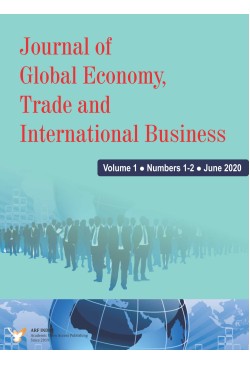
Journal of Global Economy, Trade and International Business
Frequency :Bi-Annual
ISSN :2583-0112
Peer Reviewed Journal
ROLE OF THE NGO “DESHA” IN CREATING ENTREPRENEURSHIP IN BANGLADESH: An Empirical Analysis
Entrepreneurial activities play a vital role in the social, political and economic development of a country. This study intends to investigate the effectiveness of an NGO Desha in creating entrepreneurship in Bangladesh.DESHA is not only arranging fund for creation of entrepreneurs but also providing consultancy and training for their beneficiaries in the country. Mixed method has been used to conduct the researh work. For collecting primary data,20 branches of the NGO at six districts have been visited and 101 respondents were surveyed through a closed-endedquestionnaire for quantitative analysis and an open-ended questionnaire for qualitative analysis.Time Period of the research work is from November 1, 2020 to January31,2021.For the qualitative analysis, the study analyzed two cases which showed that effort in building entrepreneurship by DESHA seems to be successful.From quantitative analysis, the study finds that reliability test of the collected data was significant and out of ten alternative hypotheses, nine were accepted. Overall, the study observed that DESHA’s initiatives in creating Entrepreneurship among its beneficiaries have been successful in improving the livelihood and social status in the country.DESHA should try replicate its activities in the other parts of the country.
Keywords: Entrepreneurship, DESHA, Political economy, Social Mobility, Economic Development, COVID 19
JEL Classifications: O10, P11, L26
COMPETITIVENESS, LOGISTICS, FOREIGN INFLUENCES, AND GDP: A PATH ANALYSIS
This paper examines the complex relationship between competitiveness, foreign direct investment, trade turnover, logistics, and GDP for 123 countries for the year 2016, using path analysis. Our results indicate a significant and positive relationship between competitiveness and foreign direct investment, between foreign direct investment and GDP but not between competitiveness and GDP. Further testing shows the indirect effect of competitiveness on GDP via the mediating effect of foreign direct investment. Competitiveness also positively and significantly impacts logistics performance. However, contrary to expectations, trade turnover does not impact logistics performance and logistics performance does not impact GDP. Also, we find negative but significant relationship between trade turnover and GDP. The results of this paper, though useful for academics and policy makers, need to be replicated for other years to confirm the findings and also to test how relationships between variables evolve overtime.
Keywords: Competitiveness, foreign direct investment, trade turnover, logistics performance, GDP, path analysis.
JEL codes: F20, O19, O43
IS BUDGETARY POLICY MORE EFFICIENT THAN MONETARY POLICY TO STABILIZE THE COVID SHOCK?
With a simple macro-economic modelling, wehighlight the respective potential advantages of monetary and budgetary policies in the framework of a both negative demand and supply shock like the COVID crisis. We show the ambiguous consequences of an expansionary monetary policy: inflationary tensions and the increase of the real wage candepress labor demand and supply. Furthermore, if monetary policy is constrainedor if wages are rigid, monetary policy cannot avoid a global recession proportional to the negative demand shock. Therefore, budgetary policies would be more appropriate to fight the recessionary consequences of a complex shock likethe COVID. More precisely, the best fiscal policy appears to decrease the consumption taxation rate morethan the negative demand shock. Besides, whatever the degree of wages rigidity, increasing the relative share of public investment in comparison with public consumption expenditure would be very efficient to stabilize a negative supply shock.
Keywords: Supply shocks, demand shocks, COVID-19, monetary policy, budgetary policies.
JEL Classification Codes: E24, E30, J20
DETERMINANTS OF BANK DIVIDEND POLICY USING DATA FROM U.S. BANKS : An Empirical Investigation
The prior papers used publicly traded bank holding companies whereas this paper uses both public and private banks in different sizes. Through tools robust tools it shows that present dividends are related to past dividends, past earnings and present earnings. This comes from a data set that includes community banks as well large banks. The results of this study are stronger statistically and due to the wider range of banks in the sample may be more general.
JEL Classification: G21, G35
WHAT IS PREVENTING WOMEN’S FINANCIAL INCLUSION? A CAMEROONIAN EVIDENCE
In the quest for the determinants of financial inclusion, the role and relevance of gender has increased in recent years, particularly in Africa where financial inclusion is low. Thus, this study identifies the factors that hinder the financial inclusion of women in Cameroon. Based on data from the World Bank’s Global Findex, we applied a probit model and a Heckman selection model. The results show that there is no significant gender difference in access to an account and some uses of the account. On the other hand, women have a lower probability of accessing credit than men. In addition, several factors have been identified as preventing women from including themselves financially. Overall, vulnerable women are young, poorly educated and those with relatively high incomes. Also, the lack of confidence in the formal Cameroonian financial market, the perception of a lack of money and the perception of the uselessness of having a formal account are all factors responsible for the financial exclusion of Cameroonian women. The results of this research could serve as an alarm bell for Cameroonian policy makers to combat gender discrimination in financial inclusion, mainly access to credit.
Keywords: Financial inclusion, gender, probit, Heckman, Cameroon
JEL Classification: G21, O16, O55